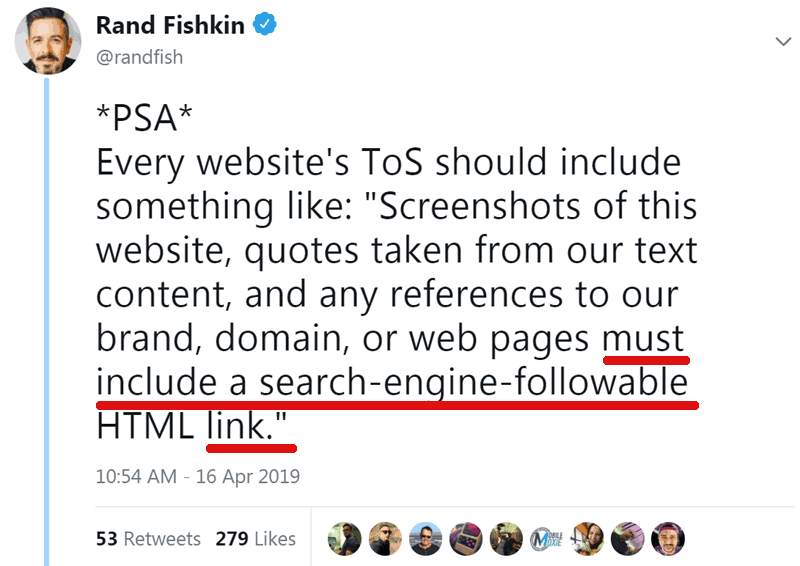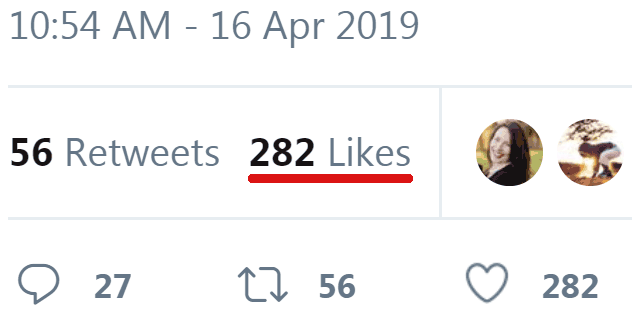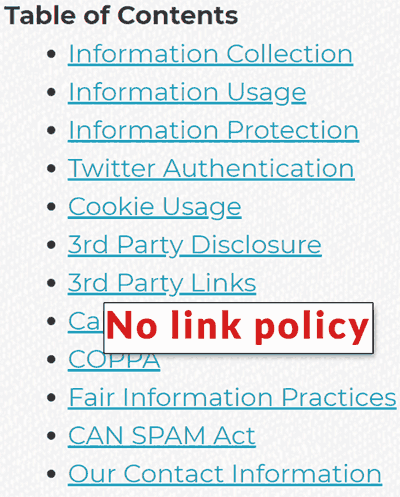A recent exchange on Twitter between Rand Fishkin and Google’s Danny Sullivan highlighted the tension between Google and the SEO community regarding links. This time it was over the idea of links to sources that are quoted by websites like news organizations. Are sources quoted by news organizations and other sites entitled to a do-follow link?
Are News Sources Entitled to a Link?
I have seen anecdotal reports on Facebook and Twitter of news organizations refusing to link to a source that is quoted in an article. Many in the SEO industry believe that if they or their client is quoted in a news article that they are entitled to a link back to their website.
Rand Fishkin resurrected this idea when he tweeted:
“Every website’s ToS should include something like: “Screenshots of this website, quotes taken from our text content, and any references to our brand, domain, or web pages must include a search-engine-followable HTML link.
…Why?
Because when other sites write about you/use your stuff, they *should* be linking, and it should be a ToS violation when they don’t.
Pointing an obstinate author of a piece that uses a screenshot of/quote from your site to said ToS can ease that link request conversation.…100% enforcement isn’t the goal. Like a lot of legalese, it’s just there to reduce friction when you ask for credit, and add friction when folks try to circumvent it.”

Many SEOs Agree that Linking Back is Important
 Over 282 people agreed that requiring links from sites that quote or use content should link back.
Over 282 people agreed that requiring links from sites that quote or use content should link back.Many in the SEO community responded enthusiastically to the suggestion that if someone is quoted by another site or content is used, that a link should be required. Here is a sample of the positive responses:
Simple, and super important advice.
great advice! Any tips on how to enforce it though?
Requiring Links Versus Holistic SEO
But there were others who disagreed with the idea that news sources were entitled to links. One person noted that focusing on links went against the principles of holistic SEO. Holistic SEO is the idea that search engine optimization is more than just acquiring links.
Holistic SEO embraces the idea of creating the kind of content that will stimulate links on its own, without having to ask for it. Creating content on a news site, with just a brand mention, falls into the category of holistic SEO. It’s part of the holistic SEO practice of creating awareness and building a brand.
Here is what one person observed on Twitter:
“Interesting idea. I personally couldn’t imagine quoting someone’s site and not linking to it.
But also, many news sites simply won’t link out, and I wouldn’t want them to not quote me or my brand and not get a citation just because they have a no link policy.”
“OMG no. No. So every time we wrote about Ripoff Rept and the hundreds of other s**tty sites we covered on SEL, we would have to include a followed link if they had that in their TOS? And risk a lawsuit for violation? No. Bad idea.”
Rand Fishkin acknowledged the shortcoming in his suggestion:
“Good counterpoint! I’d argue it’s still worthwhile for site owners to use it to nudge a link when they receive coverage or when their content, images, etc get used. Publishers could certainly choose not to, just as 1000s of businesses choose not to respect Google’s ToS.”
“Implicit legal strong-arming is a terrible link building strategy. It was a bad idea 20 years ago when brands just discovering the internet thought they could control how others mentioned/linked to them, and it’s a bad idea now.”
Putting ideas out there and having them subjected to pushing and prodding is how the best ideas rise to the top.
Being able to accept constructive criticism, as Fishkin did, is a virtue. Being able to civilly discuss an issue and admit to a flaw in something they suggested is a sign of good character, in my opinion.
Is Requiring a Link via Terms of Service Black Hat?
A smart SEO tweeted that requiring a link via a Terms of Service (TOS) violates Google’s Search Quality Guidelines:
“This is almost a word for word violation of one of Google’s definitions of a link scheme from their guidelines.”

This is the part of Google’s Guidelines that he quoted:
“Requiring a link as part of a Terms of Service, contract, or similar arrangement without allowing a third-party content owner the choice of using nofollow or other method of blocking PageRank, should they wish.”
This is how Moz.com defines black hat SEO:
“Black hat: Search engine optimization practices that violate Google’s quality guidelines.”
Requiring a Link is Black Hat
It’s clear that requiring a “search-engine-followable HTML link” is black hat. The reason is because it’s not a real citation. If you force someone to link to you then it’s not a real citation, it’s essentially paid for.
It’s similar to a paid link. A paid link is when a site receives a link by giving a payment to another site. In this case, the currency is content content, a quote or an image.
Should You Require a Link in Your TOS?
As of this writing, one person tweeted that they will be adding this to their terms of service:

Out of almost 300 likes for the post, nobody else in that Twitter discussion has tweeted that they added it to their TOS… including the person who recommended it in the first place.

Images by Shutterstock, Modified by Author
Screenshots by Author, Modified by Author